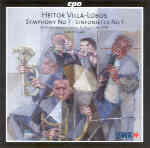This excellent disc continues CPO’s marvelous and important ongoing survey of Villa-Lobos’ complete symphonies. It’s a mystery to me why anyone would claim that Villa-Lobos was not a natural-born symphony composer, not just because he wrote 12 of them, but also because they sound just like everything else he wrote–busy, exotic, and wholly characteristic of his inimitable style. Symphony No. 7 begins like one of his Amazonian tone poems, with “bird call” glissandos, glittering percussion, celesta, harp, and piano, and loony string writing that has to be heard to be believed. The ensuing lento must be accounted one of the most beautiful slow movements in all of the symphonies, attractive of melody and gorgeously scored.
The busy scherzo and finale (with its abrupt and surprising ending) make short and entertaining work of the piece’s 36-minute total time. It’s actually one of the longer symphonies, and it’s so packed with incident that it could have been much lengthier without the slightest suspicion of tedium. As with previous issues in this series, Carl St. Clair and the Stuttgart orchestra do a sensational job with what sounds like horrendously difficult music to play well. The violins in particular should be proud of their death-defying willingness to boldly go where few string sections have gone before.
Sinfonietta No. 1 dates from 1916 (the symphony from 1945), making it one of the composer’s earliest orchestral works. It lacks the ethnic elements that give the later pieces their special character, but it’s very well written for a small orchestra, tuneful and appealing. It’s also much easier to play, and we might expect St. Clair and his band to relax into this sunny music with casual expertise. CPO’s sonics uphold the high standards of the house (the SWR engineers always do excellent work). Anyone collecting this series will find this release self-recommending, but the curious also will be well rewarded by starting here.
































